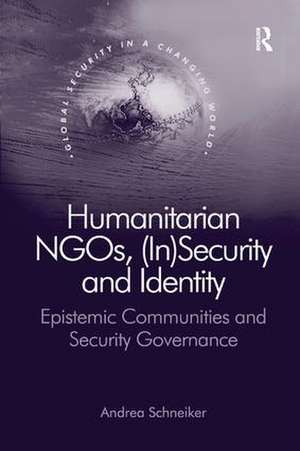Humanitarian NGOs, (In)Security and Identity: Epistemic Communities and Security Governance: Global Security in a Changing World
Autor Andrea Schneikeren Limba Engleză Paperback – 12 oct 2017
Preț: 308.06 lei
Preț vechi: 369.51 lei
-17% Nou
Puncte Express: 462
Preț estimativ în valută:
58.96€ • 61.32$ • 48.67£
58.96€ • 61.32$ • 48.67£
Carte tipărită la comandă
Livrare economică 14-28 aprilie
Preluare comenzi: 021 569.72.76
Specificații
ISBN-13: 9781138573093
ISBN-10: 1138573094
Pagini: 164
Dimensiuni: 156 x 234 mm
Greutate: 0.24 kg
Ediția:1
Editura: Taylor & Francis
Colecția Routledge
Seria Global Security in a Changing World
Locul publicării:Oxford, United Kingdom
ISBN-10: 1138573094
Pagini: 164
Dimensiuni: 156 x 234 mm
Greutate: 0.24 kg
Ediția:1
Editura: Taylor & Francis
Colecția Routledge
Seria Global Security in a Changing World
Locul publicării:Oxford, United Kingdom
Notă biografică
Andrea Schneiker is Professor of Political Science at the University of Siegen. She received her PhD in political science from the University in Münster. She has published in Disasters and VOLUNTAS: International Journal of Voluntary and Nonprofit Organizations, as well as in Millennium, Comparative European Politics, Security Dialogue and Cambridge Review of International Affairs (all together with Jutta Joachim).
Recenzii
’Humanitarian workers are being attacked and killed in ever greater numbers. Combining sophisticated theory and in-depth empirical research, Andrea Schneiker sheds new light on the ways that humanitarians are responding to these threats. By elaborating the concept of epistemic communities with different forms of trust in and among humanitarian organizations, she innovatively shows how diverse security experts have created networks to promote and implement security policies. This volume is required reading for practitioners and scholars who want to understand how the humanitarian system has responded to the growing security challenges.’ Dennis Dijkzeul, Ruhr University Bochum, Germany ’Provides a fascinating account of the important role the epistemic community of humanitarian security experts has played in establishing security governance for international humanitarian NGOs. This timely volume informs us of the many new challenges inherent in humanitarianism today, especially in the context of core debates surrounding the politicization and militarization of aid. This compelling book is a valuable contribution to the epistemic communities literature.’ Mai’a K. Davis Cross, Northeastern University, Boston, USA
Cuprins
Chapter 1 Introduction; Chapter 2 Humanitarian NGOs and their Identity(ies) in the Light of Recent and Ongoing Changes; Chapter 3 Humanitarian NGOs’ Responses to Insecurity; Chapter 4 Epistemic Communities and the Institutionalization, Professionalization and Standardization of Humanitarian NGO Security Management; Chapter 5 From Experience-Based Trust to Identity-Based Trust; Chapter 6 Conclusion;
Descriere
Increasingly humanitarian NGOs operate in the context of armed conflicts where the security risks are higher than in contexts of natural disaster. For NGOs it is difficult to accept that they are attacked despite their good intentions, sometimes even by the very communities they seek to help. As such, humanitarian NGOs have to change their approaches to security by not only adapting their policies, procedures and structures to the changing environment, but also review the underlying principles of their work. This book contributes to debates by demonstrating how issues of (in)security affect humanitarian NGOs and the humanitarian identity, situating the structural changes within the humanitarian NGO community in the context of conflict aid governance and explains how non-state actors establish their own governance structures, independent from state-sponsored solutions, and contributes to the emerging literature on the redefinition of the concept of epistemic communities.











